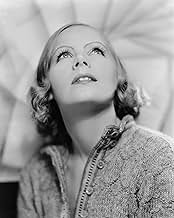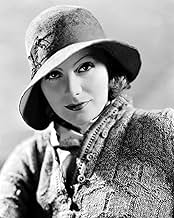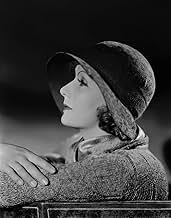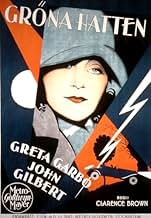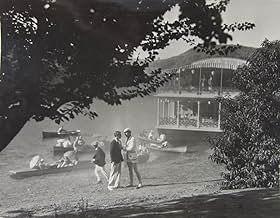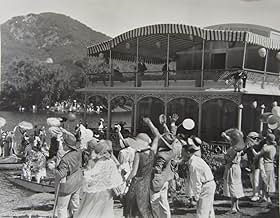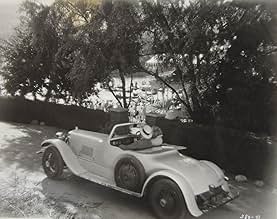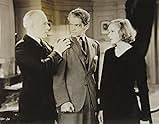PUNTUACIÓN EN IMDb
7,1/10
1,8 mil
TU PUNTUACIÓN
Añade un argumento en tu idiomaWhen two childhood sweethearts are kept from marrying, misery ensues.When two childhood sweethearts are kept from marrying, misery ensues.When two childhood sweethearts are kept from marrying, misery ensues.
- Dirección
- Guión
- Reparto principal
- Nominado para 1 premio Óscar
- 2 premios y 1 nominación en total
Johnny Mack Brown
- David Furness
- (as John Mack Brown)
Gertrude Astor
- Party Guest
- (sin acreditar)
Agostino Borgato
- French Police Inspector
- (sin acreditar)
F.F. Guenste
- Servant at Davids Death Investigation
- (sin acreditar)
Sydney Jarvis
- Gendarme
- (sin acreditar)
Fred Kelsey
- Detective
- (sin acreditar)
Anita Louise
- Diana - as a Child
- (sin acreditar)
Alphonse Martell
- French Hotel Concierge
- (sin acreditar)
William H. O'Brien
- Man Peering Into Room
- (sin acreditar)
Frank Finch Smiles
- Butler
- (sin acreditar)
Reseñas destacadas
Greta Garbo was the antithesis of the old fashioned, expressive silent movie actors of yesteryear. Instead of wildly moving her arms and gesturing her emotions with her total body, the Swedish actress expressed her characters' emotions by way of little hints of facial movements. A perfect example of her subtle acting expressions is seen in her third movie with actor and lover John Gilbert in December 1928's "A Woman of Affairs."
Movie critic David Denby described her acting style in the way she lowered her "head to look calculating or flutters her lips. Her face darkens with a slight tightening around the eyes and mouth; she registers a passing idea with a contraction of her brows or a drooping of her lids. Worlds turned on her movement."
"A Woman of Affairs" was another huge money-maker for MGM. The movie proved that Garbo was becoming a printing press of dollar bills for the studio. This was her fifth Hollywood film, and the adoring public continued to flock to movie houses nationwide to witness those slight yet profound expressions. As a contemporary reviewer penned in 1929, "She has glamour and fascination for both sexes which have never been equaled on the screen." Based on a 1925 play adapted from the 1924 best-selling but controversial novel The Green Hat, by Michael Arlen, "A Woman of Affairs" forced MGM to rework some the important details mentioned in both the novel and the play that included descriptions of syphilis, miscarriages and heroin use. The Will Hays Production Code frowned on those topics. The story, set in England, focuses on three childhood friends, Neville (John Gilbert), who falls for friend Diana (Garbo). An assignment to Egypt causes Neville to miss his opportunity to marry Diana, who ends up crossing the threshold with her other childhood friend, David (Johnny Mack Brown). During their honeymoon, David commits suicide for embezzlement. Setting off a soap opera-like drama is Diana's eye-popping discovery that Neville has returned to England several years later with a new-found love in Constance (Dorothy Jeffry).
Critics point out the movie's highlight occurs when Garbo is in the hospital nine months after she spent an evening over Neville's house. It's hinted she's had a miscarriage, which explains her passion to cradle a bundle of flowers. The sequence displays every emotion an actress can possibly show: from crying, to loving, to questioning, to a sense of loss and hope. Garbo informs the viewers all this simply by her facial expressions. Because of such a highly emotional sequence in the hospital, Garbo's clout with the studio was so valuable that MGM granted her the unusual request that visitors, including studio executives, be restricted from the set. The actress even asked black screens be built surrounding the area she was filming so extras and even technicians couldn't view her acting. Garbo defended her closed sets by explaining "If I am by myself, my face will do things I cannot do with it otherwise."
No one could argue about the results Garbo gave on the big screen. And the beancounters in the studio's accounting room stood by the actress's on-set demands after their offices were flooded with the receipts from the tremendous amount of tickets she sold under the MGM logo.
Movie critic David Denby described her acting style in the way she lowered her "head to look calculating or flutters her lips. Her face darkens with a slight tightening around the eyes and mouth; she registers a passing idea with a contraction of her brows or a drooping of her lids. Worlds turned on her movement."
"A Woman of Affairs" was another huge money-maker for MGM. The movie proved that Garbo was becoming a printing press of dollar bills for the studio. This was her fifth Hollywood film, and the adoring public continued to flock to movie houses nationwide to witness those slight yet profound expressions. As a contemporary reviewer penned in 1929, "She has glamour and fascination for both sexes which have never been equaled on the screen." Based on a 1925 play adapted from the 1924 best-selling but controversial novel The Green Hat, by Michael Arlen, "A Woman of Affairs" forced MGM to rework some the important details mentioned in both the novel and the play that included descriptions of syphilis, miscarriages and heroin use. The Will Hays Production Code frowned on those topics. The story, set in England, focuses on three childhood friends, Neville (John Gilbert), who falls for friend Diana (Garbo). An assignment to Egypt causes Neville to miss his opportunity to marry Diana, who ends up crossing the threshold with her other childhood friend, David (Johnny Mack Brown). During their honeymoon, David commits suicide for embezzlement. Setting off a soap opera-like drama is Diana's eye-popping discovery that Neville has returned to England several years later with a new-found love in Constance (Dorothy Jeffry).
Critics point out the movie's highlight occurs when Garbo is in the hospital nine months after she spent an evening over Neville's house. It's hinted she's had a miscarriage, which explains her passion to cradle a bundle of flowers. The sequence displays every emotion an actress can possibly show: from crying, to loving, to questioning, to a sense of loss and hope. Garbo informs the viewers all this simply by her facial expressions. Because of such a highly emotional sequence in the hospital, Garbo's clout with the studio was so valuable that MGM granted her the unusual request that visitors, including studio executives, be restricted from the set. The actress even asked black screens be built surrounding the area she was filming so extras and even technicians couldn't view her acting. Garbo defended her closed sets by explaining "If I am by myself, my face will do things I cannot do with it otherwise."
No one could argue about the results Garbo gave on the big screen. And the beancounters in the studio's accounting room stood by the actress's on-set demands after their offices were flooded with the receipts from the tremendous amount of tickets she sold under the MGM logo.
I'd seen the remake Outcast Lady before I rented the original silent version A Woman of Affairs. In both stories, the plot is heavily censored from the novel, but if you don't know what's been cut it still seems entertaining and complex.
In this cast, Greta Garbo is in love with her childhood friend, John Gilbert, but his father doesn't approve. When he sends his son away for a years-long business trip, Greta retaliates by marrying her brother's best friend, Johnny Mack Brown. On their wedding night, Johnny gets upset and commits suicide, but since Greta refuses to tell anyone why he was so upset, everyone assumes it was her fault. Her brother, Douglas Fairbanks, Jr., in particular, blames her and accuses her of confessing sinful secrets to Johnny that made him rather die than face a life with her. Greta is banished, and Doug Jr. drinks to drown his sorrows. Only one man continually stands up for her, her pal Lewis Stone, who might harbor more than friendship in his heart.
In both versions, the woman's character doesn't really make sense. You can get past her marrying a man she doesn't love because she believes the man she does love has forgotten her, but accepting a banishment and terrible reputation when a simple explanation could have cleared things up doesn't make much sense. And after such a terrible scandal, for which she is blamed, it hardly makes sense to turn into a hussy. Why is that the answer to her problems? The rest of it is a good old-fashioned melodrama, so if you like soapy plots like that, you'll probably like to see one of the versions. Having seen both, I actually prefer the silent movie to the talkie. The story is simple and doesn't need a lot of dialogue, and since it's so over-the-top, it makes sense to have over-the-top acting to go along with it.
In this cast, Greta Garbo is in love with her childhood friend, John Gilbert, but his father doesn't approve. When he sends his son away for a years-long business trip, Greta retaliates by marrying her brother's best friend, Johnny Mack Brown. On their wedding night, Johnny gets upset and commits suicide, but since Greta refuses to tell anyone why he was so upset, everyone assumes it was her fault. Her brother, Douglas Fairbanks, Jr., in particular, blames her and accuses her of confessing sinful secrets to Johnny that made him rather die than face a life with her. Greta is banished, and Doug Jr. drinks to drown his sorrows. Only one man continually stands up for her, her pal Lewis Stone, who might harbor more than friendship in his heart.
In both versions, the woman's character doesn't really make sense. You can get past her marrying a man she doesn't love because she believes the man she does love has forgotten her, but accepting a banishment and terrible reputation when a simple explanation could have cleared things up doesn't make much sense. And after such a terrible scandal, for which she is blamed, it hardly makes sense to turn into a hussy. Why is that the answer to her problems? The rest of it is a good old-fashioned melodrama, so if you like soapy plots like that, you'll probably like to see one of the versions. Having seen both, I actually prefer the silent movie to the talkie. The story is simple and doesn't need a lot of dialogue, and since it's so over-the-top, it makes sense to have over-the-top acting to go along with it.
This film is a great Garbo vehicle, and has such a perfect example of her mystique. She somehow manages to be a woman who enjoys sexual pleasure and the company of men, but at the same time, is saintly, with a love that is pure for only one man, and sacrifices herself in more than one way ... and she is transcendent on both sides of this coin. The film is packed with moments where a range of her wonderful expressions are on display, some vivid, some subtle. If you're a Garbo fan or want to become one, this would certainly not be a bad place to start.
Unfortunately, the film suffers a bit from a heavy dose of melodrama, most of which seems pretty contrived. The plot often doesn't make a lot of sense, in part because the original story was watered down pretty significantly for the censors. An example of this is the questioning of Garbo after her husband has committed suicide. It's obvious why this happened; he was about to be arrested for embezzlement and the police saw him jump, so the viewer (ok me anyway) is watching the aftermath thinking huh? In the original, however, it was because he has syphilis, something that was obviously a personal secret, and hence the questioning (and also later shunning) of Garbo. There are other examples that took too much of the edge off the story and made it less sensical.
Garbo dominates the film, but it's a fine cast behind her. John Gilbert is given less to do here which is too bad, but the chemistry the pair had is quite evident in a couple of open lip kisses. Dorothy Sebastian is radiant as a virtuous woman, and Douglas Fairbanks, Jr. is suitably desperate as an alcoholic.
The film touches on marrying someone who is decent and loving them for that quality, but being passionate and truly in love with someone else, which is a timeless theme. The scene where Garbo is waiting in her honeymoon bed and gets a tepid kiss on the forehead, then in frustration resorts to turning on and off the overhead light after being left alone says it all. At one point her real love, played, by Gilbert, asks "Why did I ever let you go?" to which she responds "Yes, why?", and I don't think the film gives a good answer to this question, especially as it plays out. The pace as it does so is a little on the slow side too, and the dramatic ending is over-the-top. It's a near miss for getting a higher rating, but it's certainly watchable for Garbo.
Unfortunately, the film suffers a bit from a heavy dose of melodrama, most of which seems pretty contrived. The plot often doesn't make a lot of sense, in part because the original story was watered down pretty significantly for the censors. An example of this is the questioning of Garbo after her husband has committed suicide. It's obvious why this happened; he was about to be arrested for embezzlement and the police saw him jump, so the viewer (ok me anyway) is watching the aftermath thinking huh? In the original, however, it was because he has syphilis, something that was obviously a personal secret, and hence the questioning (and also later shunning) of Garbo. There are other examples that took too much of the edge off the story and made it less sensical.
Garbo dominates the film, but it's a fine cast behind her. John Gilbert is given less to do here which is too bad, but the chemistry the pair had is quite evident in a couple of open lip kisses. Dorothy Sebastian is radiant as a virtuous woman, and Douglas Fairbanks, Jr. is suitably desperate as an alcoholic.
The film touches on marrying someone who is decent and loving them for that quality, but being passionate and truly in love with someone else, which is a timeless theme. The scene where Garbo is waiting in her honeymoon bed and gets a tepid kiss on the forehead, then in frustration resorts to turning on and off the overhead light after being left alone says it all. At one point her real love, played, by Gilbert, asks "Why did I ever let you go?" to which she responds "Yes, why?", and I don't think the film gives a good answer to this question, especially as it plays out. The pace as it does so is a little on the slow side too, and the dramatic ending is over-the-top. It's a near miss for getting a higher rating, but it's certainly watchable for Garbo.
"Garbo had something behind the eyes that you couldn't see until you photographed her in close-up. You could see thought. If she had to look at one person with jealousy, and another with love, she didn't have to change the expression. You could see it in her eyes as she looked from one to the other. And nobody else could do that on the screen." (director Clarence Brown in a 1968 interview).
Perhaps, you may consider it strange of me to quote Brown's memorable words about Garbo under the title of the film which is, most definitely, not the top - famous film with Greta Garbo. Yes, it is true that not many people have seen A WOMAN OF AFFAIRS (1928), comparing its popularity to her other films, like FLESH AND THE DEVIL, NINOTCHKA or GRAND HOTEL. Furthermore, it was not released on DVD in September 2005, on the occasion of her birth's 100th anniversary . Yet, it is one of the most unforgettable films where Garbo's silent performance has a soul throughout. But, at the same time, the movie can also boast marvelous cinematography, great performances from all cast, an interesting content, and the original soundtrack which opens it to a new era of the 1920s cinema, something in between silent and sound films with dialogs.
Let's start from the first aspect, CINEMATOGRAPHY. There are shots in this film that leave such a deep trace in the viewer that it is hard to forget them. I was absolutely astonished when I saw the moment where Diana (Greta Garbo) walks down the hill in the garden. The lighting and camera movement make such an effect that you simply admire the whole moment. The light is directed towards Diana's figure walking quickly but desperately after a bitter conversation with Morton Holderness (Howard Bosworth), an honorable father of her beloved Nevs (John Gilbert). Another brilliant scene is the one with flowers. Diana, recovering in hospital from the shock that she went through, keeps flowers by her side which remind her of Nevs. Soon before he comes to visit her, there is a brilliant shot of Diana lying in bed, in the state of delirium, and looking at flowers. She really has a blink in her eyes and the camera is directed towards her as well the flowers that she is staring at... Terrific, brilliant shot!
The CONTENT of the movie is based on controversial novel by Michael Arlen, THE GREEN HAT. However, I am not going to compare these two since the film can be watched without the knowledge of the book whatsoever. Since the novel entailed a lot of controversial things, the code made the producers change much, even names. What is more, the credits of the film had no information except "from the novel by Michael Arlen," skipping the fact which novel it was. Therefore, the content was so much changed that the film becomes quite a different story. But, a very interesting one. Except for many things worth attention, I particularly like three aspects about the content. Firstly, it shows the psychological struggle between honor and love, reason and emotions. This clash is most accurately presented in Diana - Morton's conversation at the tree when the elderly gentleman wants to stop the "silly boy and girl attachment" between Diana and his son, Nevs. Morton's character is expressed in another moment when he says to his son trying to convince him to give up the relationship "Ten generations are watching you!" Secondly, the content perfectly shows what a passionate love really means. It is not the matter of choice where I say "yes" or "no" but has a deep insight into the psyche of a particular person. Although Nevs is happy with his wife Constance (Dorothy Sebastian), he cannot stop thinking about Diana whom he has known since the light hearted days of childhood. Thirdly, humorous moments make the rather sad content brighter. Some of them may seem dated, but they are funny in a different way. For instance, the wit about lip rouge is not found in films nowadays. Nevertheless, such script may still be amusing.
The PERFORMANCES are absolutely outstanding. It is the third film in which Garbo appears with her real-life love interest John Gilbert and they both give marvelous jobs here. Their relationship is not that intimate and sensual as in FLESH AND THE DEVIL (1926), but it is more "hearty". Garbo gives her best performance when she is hugging the flowers in hospital. She completely opens herself to a viewer and you can read her mind, similarly like in the final shot of her 1933 masterpiece "Queen Christina". Gilbert is an elegant young person who portrays a man divided into two realities - the one of honor and duties and the one of love and dreams. Lewis Stone, a mainstay of most Garbo films (from this one to many others, including GRAND HOTEL and MATA HARI), does a great job as Dr Hugh Trevelyan, who approved of the relationship. Howard Bosworth is magnificent as cruel but honorable Morton Holderness, who disapproved of their relationship. Yet, Dorothy Sebastian gives a delicate performance of a beautiful young wife of Nevs, attempting to be happy and to make other people happy. So with these great performers, you see all of them in the final 10 minute-long scene at Holderness' house, where Diana comes to talk things over with Morton. I don't know how you will react to this, but I consider the scene a masterpiece of silent performances.
All things considered, A WOMAN OF AFFAIRS is a highly recommended film which stands out in our modern era of cinema, as an example of cinematography, performances and well selected content. But it is also Garbo, one of the greatest stars of cinema, about whom one cannot forget when planning to see the movie. Indeed, you can see thought when you look at her face. Garbo ... eternal in cinema!
Perhaps, you may consider it strange of me to quote Brown's memorable words about Garbo under the title of the film which is, most definitely, not the top - famous film with Greta Garbo. Yes, it is true that not many people have seen A WOMAN OF AFFAIRS (1928), comparing its popularity to her other films, like FLESH AND THE DEVIL, NINOTCHKA or GRAND HOTEL. Furthermore, it was not released on DVD in September 2005, on the occasion of her birth's 100th anniversary . Yet, it is one of the most unforgettable films where Garbo's silent performance has a soul throughout. But, at the same time, the movie can also boast marvelous cinematography, great performances from all cast, an interesting content, and the original soundtrack which opens it to a new era of the 1920s cinema, something in between silent and sound films with dialogs.
Let's start from the first aspect, CINEMATOGRAPHY. There are shots in this film that leave such a deep trace in the viewer that it is hard to forget them. I was absolutely astonished when I saw the moment where Diana (Greta Garbo) walks down the hill in the garden. The lighting and camera movement make such an effect that you simply admire the whole moment. The light is directed towards Diana's figure walking quickly but desperately after a bitter conversation with Morton Holderness (Howard Bosworth), an honorable father of her beloved Nevs (John Gilbert). Another brilliant scene is the one with flowers. Diana, recovering in hospital from the shock that she went through, keeps flowers by her side which remind her of Nevs. Soon before he comes to visit her, there is a brilliant shot of Diana lying in bed, in the state of delirium, and looking at flowers. She really has a blink in her eyes and the camera is directed towards her as well the flowers that she is staring at... Terrific, brilliant shot!
The CONTENT of the movie is based on controversial novel by Michael Arlen, THE GREEN HAT. However, I am not going to compare these two since the film can be watched without the knowledge of the book whatsoever. Since the novel entailed a lot of controversial things, the code made the producers change much, even names. What is more, the credits of the film had no information except "from the novel by Michael Arlen," skipping the fact which novel it was. Therefore, the content was so much changed that the film becomes quite a different story. But, a very interesting one. Except for many things worth attention, I particularly like three aspects about the content. Firstly, it shows the psychological struggle between honor and love, reason and emotions. This clash is most accurately presented in Diana - Morton's conversation at the tree when the elderly gentleman wants to stop the "silly boy and girl attachment" between Diana and his son, Nevs. Morton's character is expressed in another moment when he says to his son trying to convince him to give up the relationship "Ten generations are watching you!" Secondly, the content perfectly shows what a passionate love really means. It is not the matter of choice where I say "yes" or "no" but has a deep insight into the psyche of a particular person. Although Nevs is happy with his wife Constance (Dorothy Sebastian), he cannot stop thinking about Diana whom he has known since the light hearted days of childhood. Thirdly, humorous moments make the rather sad content brighter. Some of them may seem dated, but they are funny in a different way. For instance, the wit about lip rouge is not found in films nowadays. Nevertheless, such script may still be amusing.
The PERFORMANCES are absolutely outstanding. It is the third film in which Garbo appears with her real-life love interest John Gilbert and they both give marvelous jobs here. Their relationship is not that intimate and sensual as in FLESH AND THE DEVIL (1926), but it is more "hearty". Garbo gives her best performance when she is hugging the flowers in hospital. She completely opens herself to a viewer and you can read her mind, similarly like in the final shot of her 1933 masterpiece "Queen Christina". Gilbert is an elegant young person who portrays a man divided into two realities - the one of honor and duties and the one of love and dreams. Lewis Stone, a mainstay of most Garbo films (from this one to many others, including GRAND HOTEL and MATA HARI), does a great job as Dr Hugh Trevelyan, who approved of the relationship. Howard Bosworth is magnificent as cruel but honorable Morton Holderness, who disapproved of their relationship. Yet, Dorothy Sebastian gives a delicate performance of a beautiful young wife of Nevs, attempting to be happy and to make other people happy. So with these great performers, you see all of them in the final 10 minute-long scene at Holderness' house, where Diana comes to talk things over with Morton. I don't know how you will react to this, but I consider the scene a masterpiece of silent performances.
All things considered, A WOMAN OF AFFAIRS is a highly recommended film which stands out in our modern era of cinema, as an example of cinematography, performances and well selected content. But it is also Garbo, one of the greatest stars of cinema, about whom one cannot forget when planning to see the movie. Indeed, you can see thought when you look at her face. Garbo ... eternal in cinema!
Adapted from the novel "The Green Hat", I would have retitled it "Two Gallant Ladies and The Men Who Messed Everything Up". However, even that doesn't do it justice. This is almost a feminist film. Garbo is one of the two of the last "Mad Merricks", not much more is said about the family name except that Diana is independently wealthy and somewhat reckless. In the opening scene she is driving her car wildly through the countryside with her first and only true love, Neville Holderness (John Gilbert), as a passenger. They have been in love since childhood and want to marry. However, Neville's dad, Sir Morton, does not want this marriage. No valid reason is given other than perhaps he does not want the pitter patter of little mad Merricks to end up being his heirs.
Neville has no money in his own name, so his dad uses this fact to get Neville to agree to take a job in Egypt, before he marries Diana, so that he can earn some money and start a career. Dad just wants to separate the pair on the hope that they will forget about one another. Diana sees through the ruse, and Neville doesn't even bother to say a last goodbye -again, dad's idea. Complications, heartache, and tragedy ensue.
The reason I say this is almost a feminist film is because the only two women in the film - Diana and Constance (Dorothy Sebastian) are the only virtuous people in the entire cast. Hugh (Lewis Stone), long time family friend of the Merricks, comes close, but near the end breaks a trust in doing what he thinks is a good deed. Jeffry, Diana's brother, is an alcoholic, Neville is ultimately a coward, his dad is a snob, and David Furness, who has always loved Diana and been Jeffry's hero since childhood, has his problems too. Problems so bad that Diana ruins her reputation in order to keep them secret so that the image that her brother Jeffry has of him can stay intact. In this way, she is a gallant lady. As for Constance, she is the girl of whom Neville's dad approves, so Neville marries her like the obedient son that he is. However, Constance is wise. She can see Neville and Diana are still in love, and does not blame either of them for something they cannot help. Thus she is also a gallant lady.
I'll let you watch and see how this all works out. I think it is Garbo's best silent film. She gives a strong performance in a film with a good plot and a good cast surrounding her, and as always, her chemistry with Gilbert is wonderful. Highly recommended.
Neville has no money in his own name, so his dad uses this fact to get Neville to agree to take a job in Egypt, before he marries Diana, so that he can earn some money and start a career. Dad just wants to separate the pair on the hope that they will forget about one another. Diana sees through the ruse, and Neville doesn't even bother to say a last goodbye -again, dad's idea. Complications, heartache, and tragedy ensue.
The reason I say this is almost a feminist film is because the only two women in the film - Diana and Constance (Dorothy Sebastian) are the only virtuous people in the entire cast. Hugh (Lewis Stone), long time family friend of the Merricks, comes close, but near the end breaks a trust in doing what he thinks is a good deed. Jeffry, Diana's brother, is an alcoholic, Neville is ultimately a coward, his dad is a snob, and David Furness, who has always loved Diana and been Jeffry's hero since childhood, has his problems too. Problems so bad that Diana ruins her reputation in order to keep them secret so that the image that her brother Jeffry has of him can stay intact. In this way, she is a gallant lady. As for Constance, she is the girl of whom Neville's dad approves, so Neville marries her like the obedient son that he is. However, Constance is wise. She can see Neville and Diana are still in love, and does not blame either of them for something they cannot help. Thus she is also a gallant lady.
I'll let you watch and see how this all works out. I think it is Garbo's best silent film. She gives a strong performance in a film with a good plot and a good cast surrounding her, and as always, her chemistry with Gilbert is wonderful. Highly recommended.
¿Sabías que...?
- CuriosidadesMichael Arlen's 1924 novel was turned into a play of the same title, "The Green Hat." It opened on Broadway at the Broadhurst Theatre, 235 W. 44th St., on September 25, 1925 and ran for 231 performances.
- PifiasWhen Diana (as a child) rides her bike into the tree, the cut from the little girl (with short legs and her foot off the pedal) to the stunt-double (with long legs and her foot on the pedal) is obvious.
- Citas
Title Card: The widow of David Furness faced a questioning world. Why should a man - happy as David was - take his own life - - ?
- Versiones alternativasMetro-Goldwyn-Mayer also released this picture as a totally silent movie.
- ConexionesFeatured in Strictly Dishonorable (1951)
Selecciones populares
Inicia sesión para calificar y añadir a tu lista para recibir recomendaciones personalizadas
- How long is A Woman of Affairs?Con tecnología de Alexa
Detalles
Taquilla
- Presupuesto
- 383.000 US$ (estimación)
- Duración
- 1h 38min(98 min)
- Color
- Mezcla de sonido
- Relación de aspecto
- 1.33 : 1
Contribuir a esta página
Sugerir un cambio o añadir el contenido que falta

